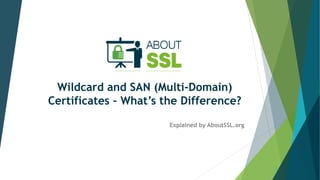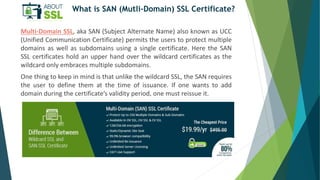Wildcard and SAN (Multi-Domain) Certificates ŌĆō WhatŌĆÖs the Difference?
- 1. Wildcard and SAN (Multi-Domain) Certificates ŌĆō WhatŌĆÖs the Difference? Explained by AboutSSL.org
- 2. The SSL certificates are becoming extensively prevalent preference thanks to escalating number of cyber-attacks. Without a shadow of a doubt, opting for SSL encryption for a website is an excellent choice but one can have a tough time pinning down the right SSL certificate. After all, there are so many categories of SSL certificates, each having its own distinct features and advantages. On our site, you can have a look at in-depth analysis and comparison of the various types of SSL certificates. Recently, we have been receiving a lot of questions regarding SAN SSL, Wildcard SSL, and their differences. Therefore, we have come up with detailed and easy to understand the comparison between the two. First, letŌĆÖs have a closer look at the wildcard SSL certificates. Introduction
- 3. What is Wildcard SSL Certificate? Wildcard SSL certificate is an excellent choice for someone having numerous subdomains as it grants a user to secure multiple subdomains along with the main domain by using a single certificate. For example, having wildcard certificate enabled can protect multiple sub-domains such as aboutssl.org, mail.aboutssl.org, ftp.aboutssl.org, login.aboutssl.org etc. by implementing a wildcard SSL certificate. The Wildcard SSL certificate comes with domain validated (DV) and organization validated (OV) SSL certificates.
- 4. Why Choose Wildcard SSL Certificate? The Wildcard SSL certificates represent an ideal choice for someone who owns multiple subdomains and wants them to be secured by means of a single SSL certificate. Wildcard certificates are no less than a boon as you donŌĆÖt have to buy and install an individual certificate for each of your sub-domain. This saves ample amount of time as you donŌĆÖt have to install SSL for each subdomain. One certificate is all it takes. Wildcard SSL not only saves your precious time, it also helps you save some money.
- 5. Advantages of Wildcard SSL Certificate ’ā╝ Flexibility Having implemented wildcard SSL certificate, one can add as many numbers of subdomains as he/she wants, whenever he/she wants. One can add new subdomains during the validity period of the certificate without having to reissue it. This is a great option to have the bearing in mind the fact that the users might want to add new subdomains which did not exist earlier. ’ā╝ Encryption Level The wildcard SSL assists the website owners with 256-bit encryption which delivers the highest level of protection. ’ā╝ Browser Compatibility The wildcard SSL certificates are recognized by 99.9+% of desktop and mobile phone browsers.
- 6. Cheap Wildcard SSL Certificates & ItŌĆÖs Providers Certificate Name Price/Year Reviews Read More Comodo PositiveSSL Wildcard $74.17 Read More RapidSSL Wildcard $127 Read More GeoTrust True BusinessID Wildcard $366.33 Read More Symantec Secure Site Wildcard $1582.67 Read More
- 7. What is SAN (Mutli-Domain) SSL Certificate? Multi-Domain SSL, aka SAN (Subject Alternate Name) also known as UCC (Unified Communication Certificate) permits the users to protect multiple domains as well as subdomains using a single certificate. Here the SAN SSL certificates hold an upper hand over the wildcard certificates as the wildcard only embraces multiple subdomains. One thing to keep in mind is that unlike the wildcard SSL, the SAN requires the user to define them at the time of issuance. If one wants to add domain during the certificateŌĆÖs validity period, one must reissue it.
- 8. Advantages of SAN (Multi-Domain) SSL Certificate ’ā╝ Greater Flexibility Although wildcard certificate is a great option to have, it fails to secure multiple primary domains. This disadvantage bears no existence as far as the SAN SSL certificate is concerned. You can secure multiple primary domains and subdomains with a single SAN certificate. ’ā╝ Encryption Level There is no distinction between the two SSL certificates as they both offer the highest level of encryption that is 256-bit. ’ā╝ Browser Compatibility Once again, there is nothing to separate the two. SAN SSL is also compatible with 99.99+% of the web browsers.
- 9. Cheap SAN (Multi-Domain) SSL Certificates & ItŌĆÖs Providers Certificate Name Price/Year Reviews Read More Comodo Positive Multi-Domain $19.99 Read More GeoTrust True BusinessID Multi-Domain $204.67 Read More Thawte SSL Web Server $82.33 Read More Symantec Secure Site $274 Read More
- 10. When to choose best one? There are few factors to be taken into consideration before making an affirmative choice between the two. The first is the type of SSL certificate you prefer. As stated above, the wildcard SSL only comes with domain validation (DV) and organization validation(OV). So, if you want to protect unlimited sub-domains, wildcard certificates should be taken into consideration. There is no option but to go with SAN if one wants to have the extended validation (EV). Another factor that definitely plays a crucial role here is the type of domains that need to be authenticated by an SSL certificate. If you have or wish to have multiple prime domains and want to establish a secure connection with all of them, SAN SSL certificate is the surely way to go. However, there is no need to spend extra bucks if you intend to shield the subdomains only.
- 11. Follow AboutSSL.org on Social Platforms AboutSSL.org is a learning platform where anyone can learn about the SSL certificates. We provide you everything about SSL, starting from its fundamental knowledge to its installation process free of cost. Visit our website - https://aboutssl.org/ Follow us on our Social Channels Twitter ŌĆō https://twitter.com/aboutssl Facebook ŌĆō https://www.facebook.com/AboutSSL/ Google Plus ŌĆō https://plus.google.com/+AboutsslOrg LinkedIn - https://www.linkedin.com/in/aboutssl











